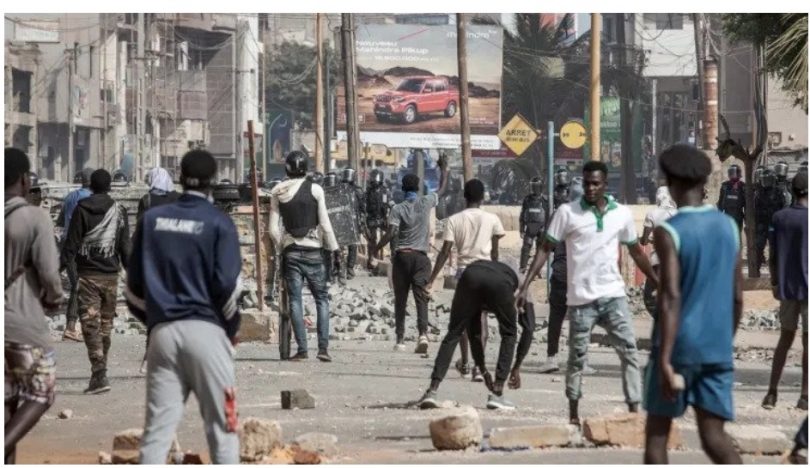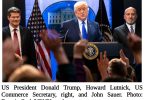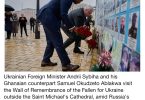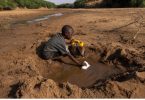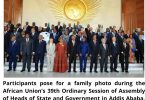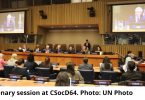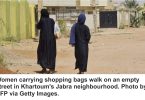In Senegal, the criminal conviction of Ousmane Sonko, a populist opposition leader has ignited widespread unrest, posing a significant threat to the long-established political stability of this West African nation. Supporters of jailed opposition leader Ousmane Sonko protest in the Senegalese capital following his two-year sentencing for “corrupting the youth.”
Late last week, violent clashes erupted between security forces and supporters of Ousmane Sonko, the charismatic leader of the opposition PASTEF party and a prominent candidate for the 2024 presidential race. Sonko was sentenced in absentia to a two-year prison term on Thursday, June 1st for charges related to “corrupting youth people” while being acquitted of an accompanying rape allegation.
According to reports, at least 16 people have lost their lives, and hundreds of others have sustained injuries amid the ongoing violence. The authorities have responded by arresting approximately 500 individuals across several cities, imposing restrictions on internet and social media access, and erecting roadblocks on crucial transport routes.
Carine Kaneza Nantulya, the Deputy Africa Director at Human Rights Watch, expressed deep concern over the recent deaths and injuries during the protests, emphasizing the need for a thorough investigation and accountability for those responsible. Nantulya stated, “The 2024 presidential elections are now set against a backdrop of alarming violence and should prompt comprehensive scrutiny. Authorities must halt the repression against protesters and critics, ensuring the preservation of the right to peaceful assembly.”

Similar sentiments of condemnation and appeals for restraint have resonated from various quarters. The spokesperson for United Nations Secretary-General Antonio Guterres, the regional bloc of the Economic Community of West African States (ECOWAS), and African Union Commission Chairman Moussa Faki Mahamat have all joined in expressing their concerns. They have urged Senegalese authorities to cease arbitrary arrests, release those wrongfully detained, including children, and respect the fundamental rights of the Senegalese people to peacefully demonstrate and protest.
Kaneza Nantulya further emphasized, “The African Union and ECOWAS possess significant influence and should employ their diplomatic weight to compel Senegalese authorities to put an end to the repression of protests and critics.”
Triggers for Unrest: Political Motivations and Socio-economic Discontent
The conviction of Ousmane Sonko has become a focal point for the widespread unrest in Senegal. Sonko steadfastly maintains that the multiple criminal cases brought against him in recent years are politically motivated, orchestrated by President Macky Sall’s government to undermine his 2024 presidential candidacy. If the conviction stands, it could effectively disqualify him from running.
Sonko’s legal troubles began in March 2021 when he was first indicted on rape charges, which he vehemently denies. Additionally, he faces separate defamation charges. Throughout the past two years, his trial dates have consistently ignited violent clashes between his supporters and authorities.
Underlying tensions among the public were already simmering due to speculation that President Sall may seek a third term in office, despite the country’s constitutional limit of two terms. Sall’s popularity has sharply declined since the last election in 2019, exacerbating the discontent.
Analysts at African specialist intelligence company Pangea-Risk argue that the roots of the unrest extend beyond politics to encompass socio-economic factors. While consumer price inflation has slowed since late 2022, it remains around 9%, with food prices surging more than 11% year-on-year. Pangea-Risk highlights that transportation costs, rents, electricity tariffs, and fuel prices continue to burden many Senegalese, impeding improvements in their living conditions. Although the country’s economy has experienced significant growth through investments in extractive sectors and infrastructure projects, the benefits have not been evenly distributed, leaving many feeling marginalized.
Within this context, many young urban residents have found solace in Sonko’s message. A former tax inspector turned whistleblower, Sonko gained prominence by exposing offshore tax havens used by the Senegalese elite. He established the PASTEF party in 2014 and, following an unsuccessful presidential bid in 2019, was elected mayor of Ziguinchor in 2022. Sonko has developed a strong base of support in the southern region of the country, as well as among disillusioned voters in urban areas and industrial zones.
Sonko has actively stoked the flames of the recent protests, with PASTEF issuing a statement calling on citizens to engage in street demonstrations. Last month, he initiated a motorcade procession from Ziguinchor to Dakar, encouraging protestors to join him along the way.
The immediate plans of the police regarding Sonko’s detention remain unclear, but any attempts to apprehend him and initiate his prison sentence would likely intensify the existing tensions. Currently, under apparent house arrest, Sonko has been advocating for a “national resistance movement” to safeguard civil liberties.

A Critical Election and Potential Ramifications
If Ousmane Sonko’s conviction stands, he could join the ranks of other opposition leaders, such as Khalifa Sall (unrelated to the president) and Karim Wade, who was disqualified from running in the 2019 election after being convicted on charges of fraudulent use of funds.
Speculation has arisen among commentators that President Macky Sall may employ a strategy to divide the opposition vote in the 2024 election. Some suggest he might grant amnesty to previously-disqualified political leaders, considering that the government’s suppression tactics have inadvertently strengthened opposition parties in recent years.
Pangea-Risk, in its Monday report, indicated that as the 2024 election approaches, the risk of civil unrest will escalate, particularly due to Sall’s administration’s efforts to curtail opposition activities and freedom of expression.
While recent violence seems to have been contained through internet restrictions and the extensive deployment of the military, Pangea-Risk warned that widespread incidents of unrest are likely to occur in major urban centres if Sonko is physically arrested or if Sall announces his candidacy for a third term as the ruling APR party’s candidate.
Pangea-Risk further emphasized that a popular backlash against Sall’s bid for an extended tenure could have significant ramifications for Senegal’s international relationships, investments, and financial stability. Strained relations with international investment partners, foreign donors, and the International Monetary Fund (IMF) may jeopardize the country’s fiscal stability, funding for subsidies, and debt servicing.
Economic Prospects and Debt Sustainability
Senegal’s medium-term economic growth prospects have received a boost with significant investments in the hydrocarbon sector. The country anticipates the commencement of several major liquefied natural gas (LNG) and crude oil projects later this year.
However, the Pangea-Risk report highlighted that in the short term, the sustainability of debt remains a primary concern due to the strain caused by costly energy subsidies on the public budget. The government, in an effort to bolster its appeal ahead of the 2024 elections, is expected to increase spending on socio-economic relief measures rather than implementing the International Monetary Fund’s (IMF) recommended subsidy cuts.
Last month, the IMF and Senegalese authorities reached an agreement for a new 36-month financing arrangement totalling around $1.526 billion under the IMF’s Extended Fund Facility and Extended Credit Facility. Additionally, a Resilience and Sustainability Facility of $327.1 million was included. The agreement encompasses fiscal consolidation, improved governance, and measures to combat money laundering and terrorism financing. Furthermore, the IMF’s mission to Dakar emphasized the importance of achieving more inclusive and job-rich growth.
The IMF’s projections indicate that non-hydrocarbon GDP growth in Senegal is expected to reach 5.3% in 2023, slightly lower than the initial forecast of 6%. However, if oil and gas production commences in the fourth quarter as planned, the total GDP growth could exceed 8% this year.
There are positive signs regarding the country’s debt position. Government debt is projected to decrease from 75% of GDP in 2022 to more sustainable levels in the coming years. Senegal’s debt position is generally regarded as stable, with the outlook considered sustainable due to the anticipated inflow of new hydrocarbon revenues later this year.

In conclusion, Senegal stands at a critical juncture as the conviction of opposition leader Ousmane Sonko and the ensuing unrest jeopardize the country’s political stability. The situation has shed light on deeper socio-economic challenges, including rising inflation and a sense of economic marginalization among the population.
The response from international organizations underscores the importance of upholding civil liberties and democratic principles. Moving forward, the outcome of events in Senegal, including Sonko’s potential arrest and the upcoming 2024 election, will shape the country’s future. Despite promising economic prospects driven by new hydrocarbon investments, debt sustainability remains a concern. Senegal’s ability to address these issues, promote inclusivity, and ensure a fair democratic process will be crucial for its stability and progress, with support from the international community playing a significant role.


